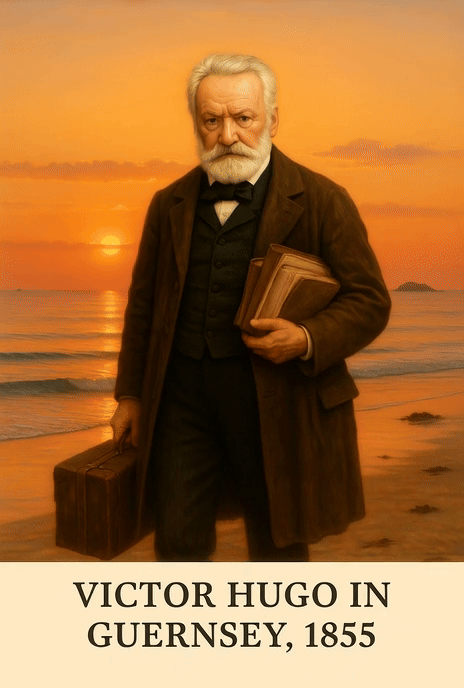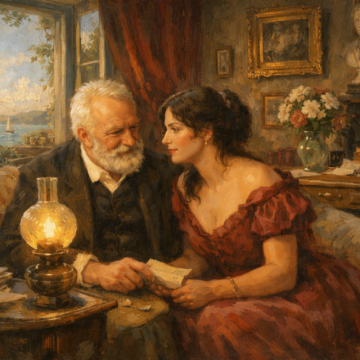The Voice Of Victor Hugo
On the cliffs of Guernsey’s shoreline,
Where the wild seas crash and roar,
An exile held his lantern high,
And dreamed of France once more.
From Paris to the Channel isles,
His pen refused to fall,
He wrote for love, he wrote for justice,
He wrote to free us all.
Victor Hugo, your words still rise,
Like thunder in the skies,
You gave the poor a song to sing,
You taught the world to cry.
From Les Misérables to Notre-Dame,
Your spirit lights the way,
Victor Hugo, your voice lives on today.
He painted saints and sinners,
With the ink of human pain,
He gave a voice to misery,
And dignity again.
The hunchback rang his bells of stone,
The barricades would flame,
And every line he carved in verse
Still whispers out his name.
Victor Hugo, your words still rise,
Like thunder in the skies,
You gave the poor a song to sing,
You taught the world to cry.
From Les Misérables to Notre-Dame,
Your spirit lights the way,
Victor Hugo, your voice lives on today.
Exiled but unbroken,
With the ocean at your door,
You dreamed of nations freer still,
And justice ever more.
Victor Hugo, your words still rise,
Like thunder in the skies,
You gave the poor a song to sing,
You taught the world to cry.
From Guernsey’s shore to Paris streets,
Your echoes never fade,
Victor Hugo, your voice will never fade.
Victor Hugo’s Voice on Guernsey’s Shore
Few figures link Guernsey so powerfully to world literature as Victor Hugo. Exiled from France after Napoleon III’s coup in 1851, Hugo settled in Guernsey in 1855, living at Hauteville House in St Peter Port. It was here, looking out across the Channel with the “wild seas crash and roar,” that he wrote some of his greatest works — and it is this period that the song above so beautifully captures.
Exile and Inspiration
The opening verse places Hugo on Guernsey’s cliffs, lantern in hand, gazing toward France. For Hugo, exile was both punishment and freedom. Stripped of his homeland, he found on Guernsey a space to reflect and to write. In those years he produced masterpieces such as Les Misérables (1862), which gave voice to the downtrodden and dignity to the poor.
As the song’s chorus reminds us:
“You gave the poor a song to sing,
You taught the world to cry.”
Hugo’s works spoke for those without power — prisoners, beggars, orphans — and demanded justice in a world too often marked by cruelty.
Saints, Sinners, and the Human Story
The second verse turns to Hugo’s characters: Quasimodo in Notre-Dame de Paris, the rebels on the barricades in Les Misérables, the “saints and sinners” painted with the “ink of human pain.” His genius lay in transforming suffering into art, and personal exile into universal language.
These stories were not just entertainment — they were acts of protest, visions of social change, and calls to empathy. They still resonate across cultures and centuries.
Guernsey’s Legacy
Hugo lived in Guernsey for 15 years. From Hauteville House, he watched storms roll across the Channel, and in that isolation created works that thundered across Europe. Today, the house remains one of the island’s most important cultural sites — a reminder that Guernsey was not just his refuge, but his crucible.
The song’s bridge honours this resilience:
“Exiled but unbroken,
With the ocean at your door,
You dreamed of nations freer still,
And justice ever more.”
Why This Song Matters
By placing Hugo on Guernsey’s shore, the song ties the island’s landscape to his universal message. It reminds us that exile did not silence him; it strengthened his voice. From the ringing of Notre-Dame’s bells to the cries of the Paris barricades, his words still echo with the power of justice, love, and freedom.
And, as the final chorus proclaims:
“From Guernsey’s shore to Paris streets,
Your echoes never fade.”
For Guernsey, Victor Hugo is more than a guest in exile. He is a part of the island’s identity — proof that even in forced separation, the human spirit can create beauty that endures.
Discover more from Guernsey Deep Dive
Subscribe to get the latest posts sent to your email.




